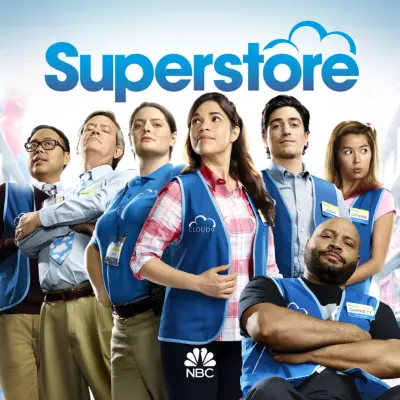Superstore stood out as one of the few to get it right — and seemingly without trying too hard
-

"In a period where 'middle America' has taken on a central role in the country’s politics, the coincidence of Superstore being set in St. Louis was perfect timing," says Kovie Biakolo in advance of tonight's series finale. "It’s true that on the show, St. Louis is more backdrop than character; but even in its shadows, the city operates more as an idea of a midsize American metropolis away from the coasts, with the idiosyncrasies of a space that has some of the access of a big city with the pleasantries of a small town. Rather than play into stereotypes or completely ignore them, the show offered an evolved depiction of the region that is closer to the truth: a place of varied people with varied politics that don’t fit neatly into the country’s dichotomies of conservative or liberal, religious or secular, patriotic or apathetic. At first, the premise of the show appears to center on Jonah (Ben Feldman), a business-school washout who takes a job at a giant retail store, Cloud 9, presumably a stand-in for Walmart. But viewers are soon disabused of any presumptions that the show will replicate yet another narrative of a lost white man seeking meaning in life from supposedly simpler people. Indeed, while the show has given Jonah an ongoing arc of his own — one that intersected with that of Amy (America Ferrera) prior to her departure in the final season — the hallmark of the show is the complexity it affords a large cast of characters, who collectively represent the multifaceted realities of working-class people within the workplace and beyond it. A highlight among these portrayals is Superstore’s presentation of Amy as a Latina woman who is not rigidly defined by this identity but is also self-conscious of it both internally and among her co-workers. In the third episode of season one, when Amy realizes she has to perform 'Latinaness' in order to boost sales at a salsa sample booth, the incident speaks to both the commodification of identity and the expectations for those who bear it to present a certain way. It’s a continuous narrative that Amy contends with at different points, but crucially, it’s not her only narrative; Amy is also at the center of the show’s outstanding commentary on sexism, sexuality, and women’s bodies."
ALSO:
- Superstore ends its run as the punch-clock analog to another great NBC workplace comedy, The Office: As Scott Tobias notes, Superstore creator Justin Spitzer wrote for The Office. "There are unmistakable echoes between the two, from the Jim and Pam-style will-they-or-won’t-they chemistry between Amy and Jonah to staff meetings that regularly descend into chaotic forums for dumb ideas or embarrassing personal squabbles," says Tobias. "And yet Superstore, with its more diverse and underpaid staff, kept bumping into issues more common to the American work force, specifically the vested legions of stockers and checkout clerks lining the aisles of Target, Walmart and other department-store beachheads. Unionization, immigration, racism, gun control, reproductive rights: The show wasn’t necessarily inclined to pick fights, but characters with low wages and few benefits are bound to have practical problems, and a store like Cloud 9 never insulated them from the outside world. It was an ecosystem, but not a bubble...So what was the America of Superstore? It’s a place where blue-collar workers cannot make a living wage and have to rely on ad-hoc solutions to problems that corporate can’t solve. When Cheyenne can’t get maternity leave, Glenn gives her a six-week paid suspension. (He is fired for that.) When deductibles become too high, Jonah tries to start a health care fund to pay for them but inadvertently creates a pyramid scheme."
- Superstore’s cast members speak about finding their chemistry and the legacy of the show: Ben Feldman tells The A.V. Club he appreciated how his own character attributes or those of others, including Glenn’s traditional views, weren’t necessarily mocked but given room to grow. “Idiosyncrasies are naturally funny and with a team of lazier writers, it would’ve been easy to belittle or poke fun at them, but it was presented as a reality and with empathy and compassion," he says. Feldman adds: “We are a TV show owned by a parent company owned by a parent company. We have corporate overlords and have felt their presence. So it was just rare to see the professional dynamic of workers with the people upstairs play out in a comedy. We were around for the Obama to Trump to Biden administration(s)—what a time in America to represent the working class and culture.” Nico Santos says he's glad to put a face on what many undocumented immigrants are going through. He says he found that storylines like Mateo’s can help “compensate for the absence of real-life contact with immigrants. It’s a great legacy to leave behind.”
- America Ferrera on returning to Superstore for the series finale: “I expected and hoped that the show would go on after my departure for many, many years,“ she tells Variety. “So it was definitely coming back sooner than I think any of us imagined. But at the same time, we knew that in the setup of how Amy left, it really lent itself to how she could come back.”
- Watch the Superstore cast's audition tapes ahead of the series finale
TOPICS: Superstore, NBC, America Ferrera, Ben Feldman
More Superstore on Primetimer:
